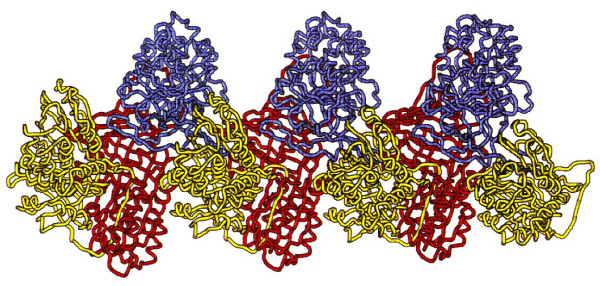Playlist
Show Playlist
Hide Playlist
Alpha-1 Antitrypsin Deficiency
-
Slides Pulmonary diseases in older children.pdf
-
Download Lecture Overview
00:01 Let's switch gears now and talk about another presentation of respiratory disease that happens a little bit later in childhood. 00:10 And let's focus now on Alpha-1 Antitrypsin Deficiency. 00:15 So in a normal person we make neutrophil elastase. 00:21 This is a substrate that is secreted by neutrophils to fight off infections. 00:28 We protect our own bodies from this elastase with alpha-1-antitrypsin. In patients who are normal, they're making alpha-1-antitrypsin in the liver as you can see here. 00:41 And then this flows to the lungs and protects our lungs from what would be damage from this neutrophil elastase. So the alpha-1-antitrypsin is protecting our lungs against the neutrophil elastase, which we're using to fight off infections . In a patient with alpha-1-antitrypsin deficiency, the problem is they can't get the alpha-1-antitrypsin out of the liver. 01:09 It's trapped in there. 01:10 And that accrual is actually causing liver damage. 01:14 Furthermore, because that can't get out of the liver, the lungs now lack the protection and the neutrophil elastase is causing lung damage. 01:27 This disease affects about 1 in 5000 people. 01:32 It's more common in Caucasians and the liver disease often starts in childhood with prolonged jaundice and no clear cause. Lung disease typically starts in adolescence or young adulthood. If an adolescent is a smoker, they will dramatically worsen their lung outcomes, and the risk of hepatocellular cancer later in life is very real. 01:59 So how do we manage these children? We worry about their lungs and their livers. 02:03 We provide supportive care for their, uh, absorption of bile salts through liver dysfunction. 02:13 They might have a problem. 02:14 We take care of that. And in addition, we manage their lung disease accordingly. 02:19 In patients with alpha-1-antitrypsin deficiency, the serum level is obtained and if it is below the effective protective threshold for the protein to work in the body, and if the patient has severe pulmonary dysfunction, we will administer weekly infusions of alpha-1-antitrypsin. 02:37 While modestly effective at improving pulmonary outcomes, it is extremely expensive therapy, and use is unfortunately limited in the United States because of cost and difficulty with the therapy.
About the Lecture
The lecture Alpha-1 Antitrypsin Deficiency by Brian Alverson, MD is from the course Pediatric Pulmonology.
Included Quiz Questions
What is the primary problem in patients with alpha-1-antitrypsin deficiency?
- Alpha-1-antitrypsin is trapped in the liver.
- Alpha-1-antitrypsin is not produced in the liver.
- Alpha-1-antitrypsin is not produced by type 2 pneumocytes in the lung.
- Alpha-1-antitrypsin is lost in the stool.
- Alpha-1-antitrypsin is lost in the urine.
Customer reviews
4,0 of 5 stars
| 5 Stars |
|
0 |
| 4 Stars |
|
1 |
| 3 Stars |
|
0 |
| 2 Stars |
|
0 |
| 1 Star |
|
0 |
Short but to the point. Good summary, easy to remember. Thanks!




